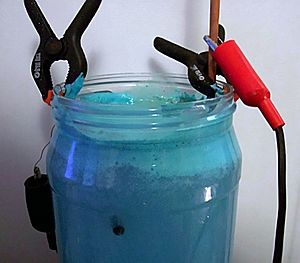Copper(II) hydroxide facts for kids
Copper(II) hydroxide, also known as cupric hydroxide, is a chemical compound. It has the chemical formula Cu(OH)2. This means it contains copper and hydroxide ions. The copper in this compound is in a special form called the +2 oxidation state.
Contents
What It Looks Like and Does
Copper(II) hydroxide is usually a light blue color. When it is wet, it feels a bit rubbery. If it mixes with copper(II) carbonate, it can look greenish.
This compound reacts with carbon dioxide in the air. When this happens, it changes into copper(II) carbonate. If copper(II) hydroxide gets wet, it can turn into copper(II) oxide. However, if it is dry, it only changes into copper(II) oxide when it is heated up. It also reacts with ammonia to create a very dark blue liquid.
How We Make It
You can make copper(II) hydroxide by mixing copper sulfate with sodium hydroxide. You could also use Potassium hydroxide, but it costs more.
Another way to make it is by using electrolysis. This involves passing electricity through a solution of sodium bicarbonate with a copper anode.
What It's Used For
Copper(II) hydroxide has several uses. It is often used to stop mold from growing in paints. It can also be used to add color to ceramics, like pottery. Sometimes, it works as a catalyst, which is something that helps chemical reactions happen faster without being used up itself.
Staying Safe
In very small amounts, copper(II) hydroxide is not considered dangerous. However, it can dissolve in the acid found in your stomach. If this happens, it forms a type of copper that can be much more easily absorbed by your body. This can lead to copper poisoning, so it's important to be careful with it.
Related pages
Images for kids
See also
 In Spanish: Hidróxido de cobre(II) para niños
In Spanish: Hidróxido de cobre(II) para niños
 | William Lucy |
 | Charles Hayes |
 | Cleveland Robinson |



